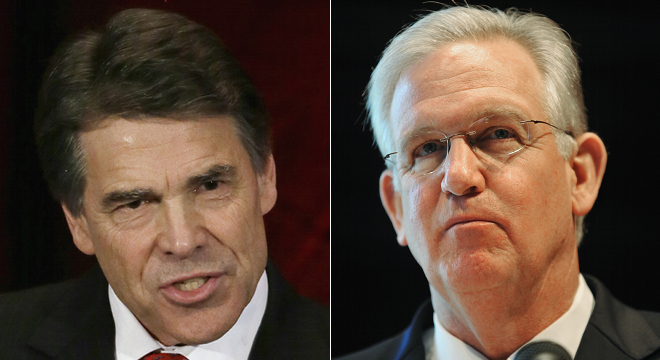Texas Gov. Rick Perry (R) and Missouri Gov. Jay Nixon (D) are in what may be the most heated spat between one governor trying to poach companies from the other governor’s state.
In the last week of August, Perry aired radio ads and made an appearance in Missouri, apparently to capitalize on Nixon’s decision to veto a bill halving the state’s corporate tax rate lowering its income tax.
“Vetoing a tax cut is the same thing as raising your taxes. But there is a state where businesses flourish and jobs are created: Texas,” Perry said in one of the ads.
Perry’s reported $200,000 advertising campaign, which includes both TV and radio ads, argues that Texas is straight-up better than Missouri thanks to its lack of income tax and pro-small business policies.
Nixon hasn’t taken Perry’s criticism lying down. He’s accused the Texas governor and former presidential candidate of job poaching and aired his own ads fighting back.
“Make no mistake, our businesses aren’t going to Texas and here’s why,” Nixon explained in the ad, pointing to Missouri’s low sales and property taxes, high graduation rates, low unemployment rate and better standardized test scores.
“And unlike Texas, Missouri has a perfect Triple-A credit rating,” digging at Standard & Poor’s rating Texas at AA+.
Perry brushed off Nixon’s criticism in an interview with the St. Louis Post-Dispatch on Thursday. “That’s the easy out, to say we’re stealing jobs, poaching jobs, poaching jobs,” Perry said. “We ought to be talking about how competition is good for states. Whether you’re an athlete or a businessperson or a governor, competition is good.”
Governors competing to get and retain businesses is a good thing, Perry argued. “I’m a huge believer in competition,” he continued to the St. Louis newspaper. “It will make not only Missouri stronger, it will make this country stronger.”
This isn’t the first time governors have sought to woo business from another state, but they usually don’t take the message quite so public. Perry himself has made a habit of personally appealing to businesses in states like Illinois, California and New York in the hopes of bringing a few back to Texas. And governors from Florida, New Jersey, South Carolina, Washington, Delaware, Indiana and Wisconsin have all reached out to businesses in other states touting the allure of their home states. Oftentimes the argument centers on lower taxes and a better business climate.
Recently, Florida Gov. Rick Scott (R) won the anger of Kentucky Gov. Steven Beshear (D) for trying to pull business from his state. At one point, in June, Scott sent letters to Kentucky businesses urging them to buy a “one way” ticket to Florida where the state’s tax and business environments, Scott argued, are more accommodating. Earlier in August the Kentucky governor had finally had enough and sent Scott a letter dubbing Scott’s efforts “crude.”
“Although I am well aware of the competitive environment that is inevitable in economic development, I admit that I was shocked and dismayed at your crude method of recruitment,” Beshear wrote.
Like Perry, Scott had no regrets. “My job is to let everyone know how well we’re doing and I’m going to continue to do that,” Scott said.
The fight even stretches to the Midwest, where Minnesota state Rep. Joe Atkins, a member of the Democratic-Farmer-Labor Party, held an interim House Commerce Committee panel on Thursday to stop Wisconsin Gov. Scott Walker (R) from spreading anti-Minnesota “propaganda” while trying to bring businesses to the Badger State. Walker, like Perry, is trying to capitalize on a $2 billion tax increased passed in the state in 2012.
“It’s not about Wisconsin bashing,” Atkins told Minnesota Public Radio. “But whenever you start comparing the two states, particularly on sports but also economically, there’s this exaggeration and propaganda and all of that tends to occur.”
Unsurprisingly, a number of governors have descended on Illinois in the past few years with the hopes of luring businesses away from the state while it suffers from serious budgetary problems. Perry, Scott, and Indiana Gov. Mitch Daniels (R) have all made personal appeals to tempt major Illinois businesses with the promise of less burdensome taxes.
Even if businesses don’t switch states, there are benefits for the governors making the offer. Governors can gain credibility by being seen as doing anything and everything to bring in new business and jobs, Brookings Institution Senior Fellow Mark Muro told TPM on Friday.
“There’s no more attractive moment for the governor than presence at the creation of jobs. So if the governor is simply out there, seeking to rest firms and relocate them to the state then he looks like an activist going to bat for the state,” Muro said. “And if he secures a relocation it’s all for the better.”
Tax rates, like what Perry and Scott have been flaunting, are oftentimes the favored incentive for governors hoping to lure new business from elsewhere. Actually, Muro said, there is little research to suggest that a business actually sees larger profits or more job creation from moving to a state with a lower tax rate.
“That one’s a particularly fatuous offering because many relocation studies notice that taxes often aren’t a huge part of the operating budget so that that is often the peripheral consideration,” Muro said.
Muro pointed to a study he did with Kenan Fikri, also of Brookings, which found that states are better off trying to foster homegrown businesses rather than through bringing in business from other states.
“The best way to create more jobs in a state is to grow them at home, rather than poach them from elsewhere,” the report said. “Some 95 percent of all job gains in a year in an average state come from the expansion of existing businesses or the birth of new establishments.”









